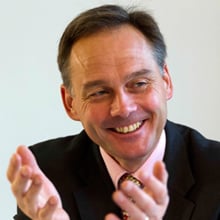The secret alchemy behind great entrepreneurial leadership

Growth has taken hold once more, but the legacy of the recession is that firms are geared for survival – not innovation. A leading business author offers bosses some ideas on how they can change tack
John Rosling
With the Organisation for Economic Cooperation and Development (OECD) upgrading the UK’s growth forecast to 3.2%, it seems we are firmly back into a growth economy. But after years of stagnation – and worse – businesses are now engineered for survival, not innovation. Leaders must quickly re-learn the skills they need to seize every opportunity as it arises. And the word on everyone’s lips seems to be “agility”.
It may seem a tough call, but if you are seeking agility and pace in your organisation, I actually think the basics of leadership are pretty simple – without being in any way easy. So-called “entrepreneurial” leadership can be defined by the three core mottos of the global performance experts Shirlaws:
1. Set the context
2. Manage the energy
3. Coach, don’t play
Here is how those maxims work in practice…
“Longing for the endless immensity of the sea”
As a leader, setting the context for your organisation is your most vital function. In that sense, conveying context is to get across why something needs to be done, not what or how it can be achieved. Context clarifies strategic direction and allows your team to deliver it – while your time and energy is freed to pursue opportunity and growth. Netflix CEO Reed Hastings understands how to lead creative and innovative people to perform. “The best leaders,” he said, “get great outcomes by setting the appropriate context, rather than by trying to control their people.”

Context also creates agility by speeding up decision-making. Particularly in this phase of the economic cycle, as leader you must be decisive even if you are uncertain. Getting your context clear can help. Sometimes you will be wrong. However, as John F Kennedy observed, “There are risks and costs to a programme of action. But they are far less than the long-range risks and costs of comfortable inaction.”
If you set the appropriate context and give talented people the autonomy to act within it, you will be amazed by the results. Ajaz Ahmed – who built digital advertising firm AKQA into a global brand – agrees. “If you hire good people,” he said, “you have to let them make decisions. We have zero committees at AKQA, and an entrepreneurial environment that means decision-making is as autonomous as it can be. Hire good people who share your values, provide clarity in what needs to be done, trust them – and give them independence to do their jobs.”
French author Antoine de Saint-Exupery framed this concept rather poetically when he said: “If you want to build a ship, don't drum up people to collect wood and don't assign them tasks and work, but rather teach them to long for the endless immensity of the sea.” That is a very lyrical way of explaining what “the why” means.
Have the confidence of your convictions and trust your instincts – they will often be right. Steve Jobs once said: “Never let the noise of other people’s opinions drown out your own inner voice.”
“Forgetting Shiela’s daughter’s wedding”
So, what of the second key aspect of business leadership – managing the energy? That should be the task of any leader, and it requires your constant attention. This is not an easy thing to do. Of course, you are allowed a day off. But you are not allowed an off day.
We’re all familiar with seeing sports stars who sweep past fans waiting patiently for an autograph. Perhaps they are having a bad day – but we imagine we would never behave like that. However, most of us do behave like that all too often. We’re stressed, or late, or distracted – and sweep through the office in our own little world. We ignore staff, forget it was Sheila’s daughter’s wedding last week… we fail to manage the energy of our team.
Uncomfortable though it may be for us as leaders, our team expects us to inspire them. To allow them to always be their best requires you to manage their energy – not the other way round.
You are not in midfield, feeding forward - you’re on the touchline
And what of “coach – don’t play”? That simply means you are willing to acknowledge that you aren’t on the field anymore. In Dan Pink’s words – as set out in his great book Drive – you have created a culture of real autonomy in your people, which allows you to support and develop their mastery.
Best of all, that starts to create an agile business – one that is independent of you, and with scalable value. It frees up your time to focus your energy and talents on seizing opportunities, and on driving scale and wealth in this growth economy.
And importantly, it’s also a lot more fun.
John Rosling is author of entrepreneurs’ bible The Secrets of the Seven Alchemists, a business school lecturer on entrepreneurship and a frequent media contributor on management and leadership topics.

Press & Media Enquiries
For more information or to request interviews, contact CMI's Press Team on 020 7421 2705 or email press.office@managers.org.uk


